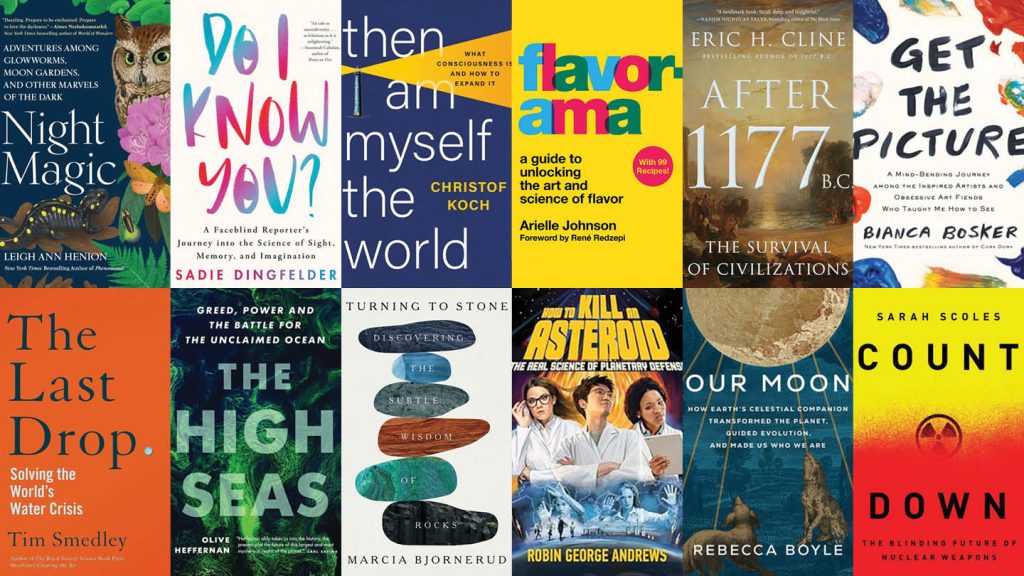Exploring the Human Condition and the World Around Us: A Deep Dive into 2024’s Notable Science Books
The year 2024 has yielded a rich harvest of books exploring the intricacies of the human experience, the challenges facing our planet, and the wonders of the universe. From the inner workings of our brains to the vast expanse of the cosmos, these works offer insightful perspectives on a wide range of topics. They delve into the impact of artificial light on ecosystems, the subjective nature of perception, the mysteries of consciousness, the science of flavor, the collapse of civilizations, the power of art, the global water crisis, the exploitation of our oceans, the wisdom of Earth’s geology, the threat of asteroid impacts, the influence of the moon, and the complex ethical dilemmas of nuclear weapons.
Leigh Ann Henion’s "Night Light" illuminates the often-overlooked importance of darkness, advocating for the preservation of natural nighttime environments and the diverse life forms they support. Sadie Dingfelder’s "Mind Thief" provides a humorous and introspective account of her life with face blindness and aphantasia, challenging our assumptions about the universality of human perception. Christof Koch’s "The Feeling of Life Itself" delves into the neuroscience of consciousness, proposing that any system capable of integrating information, including artificial intelligence, possesses the potential for conscious experience. Arielle Johnson’s "Flavorama" serves as a delightful guide to the science of taste, offering readers a chance to enhance their culinary skills with a deeper understanding of flavor profiles and molecular gastronomy.
Eric H. Cline’s "1177 B.C.: The Year Civilization Collapsed" transports us back to the Late Bronze Age, analyzing the societal transformations that unfolded during this tumultuous period. Bianca Bosker’s "The Art of the Encounter" explores the primal human fascination with art, examining its evolving role in the modern world and its intersection with science. Tim Smedley’s "Clearing the Air" addresses the pressing global water crisis, offering practical solutions and policy recommendations for sustainable water management. Olive Heffernan’s "The Blue Beyond" raises concerns about the increasing exploitation of international waters, advocating for the preservation of ocean ecosystems.
Marcia Bjornerud’s "Geopedia" intertwines personal memoir with geological insights, reflecting on the interconnectedness of human life and the Earth’s deep history. Robin George Andrews’s "Impact Winter" assesses humanity’s preparedness for asteroid threats, examining existing defense strategies and highlighting the need for further development. Rebecca Boyle’s "Our Moon" celebrates the moon’s profound influence on Earth’s life and human societies, exploring its cultural and spiritual significance while also cautioning against the potential dangers of lunar exploitation. Finally, Sarah Scoles’ "They Are Already Here" delves into the world of nuclear weapons research, revealing the complex emotions and ethical dilemmas faced by those involved in this controversial field.
These books collectively offer a captivating exploration of the human condition and the world around us, prompting reflection on our place in the universe and the challenges we face. They represent a diverse range of scientific disciplines, from neuroscience and geology to archaeology and astronomy. They offer both practical advice and philosophical insights, catering to a broad audience interested in understanding the complexities of our world. From the microscopic wonders of flavor molecules to the vastness of space, these books ignite curiosity and inspire a deeper appreciation for the intricate workings of nature and the human mind.
"Night Light" serves as a call to action for preserving natural darkness, highlighting the detrimental effects of artificial light on ecosystems and the importance of protecting nocturnal biodiversity. "Mind Thief" challenges our understanding of normal perception, revealing the diverse ways in which individuals experience the world. "The Feeling of Life Itself" pushes the boundaries of our understanding of consciousness, raising profound questions about the nature of subjective experience and its potential existence in non-biological systems. "Flavorama" delights the senses while providing a scientific foundation for culinary exploration.
"1177 B.C.: The Year Civilization Collapsed," offers a historical perspective on societal collapse and resilience, providing valuable lessons for our own time. "The Art of the Encounter" delves into the enduring power of art, examining its capacity to evoke emotions, challenge perceptions, and connect us to something larger than ourselves. "Clearing the Air" provides a comprehensive overview of the global water crisis, offering practical solutions for individuals, communities, and policymakers. "The Blue Beyond" highlights the importance of ocean conservation, urging us to protect these vital ecosystems from overexploitation.
"Geopedia" provides a unique blend of personal narrative and geological knowledge, inviting readers to appreciate the deep time scales of Earth’s history. "Impact Winter" explores the potential consequences of an asteroid impact, emphasizing the need for proactive measures to mitigate this existential threat. "Our Moon" celebrates the moon’s profound influence on life on Earth, reminding us of its scientific, cultural, and spiritual significance. "They Are Already Here" offers a rare glimpse into the world of nuclear weapons research, exploring the ethical dilemmas faced by those working in this field.
These books, taken together, represent a significant contribution to our understanding of the world and ourselves. They encourage critical thinking, inspire curiosity, and offer valuable insights into the complex challenges facing humanity. They provide accessible entry points into various scientific disciplines, demonstrating the relevance of science to our daily lives. They also showcase the power of storytelling to convey complex information in engaging and thought-provoking ways. They challenge us to question our assumptions, broaden our perspectives, and engage with the world around us in a more informed and meaningful way.


